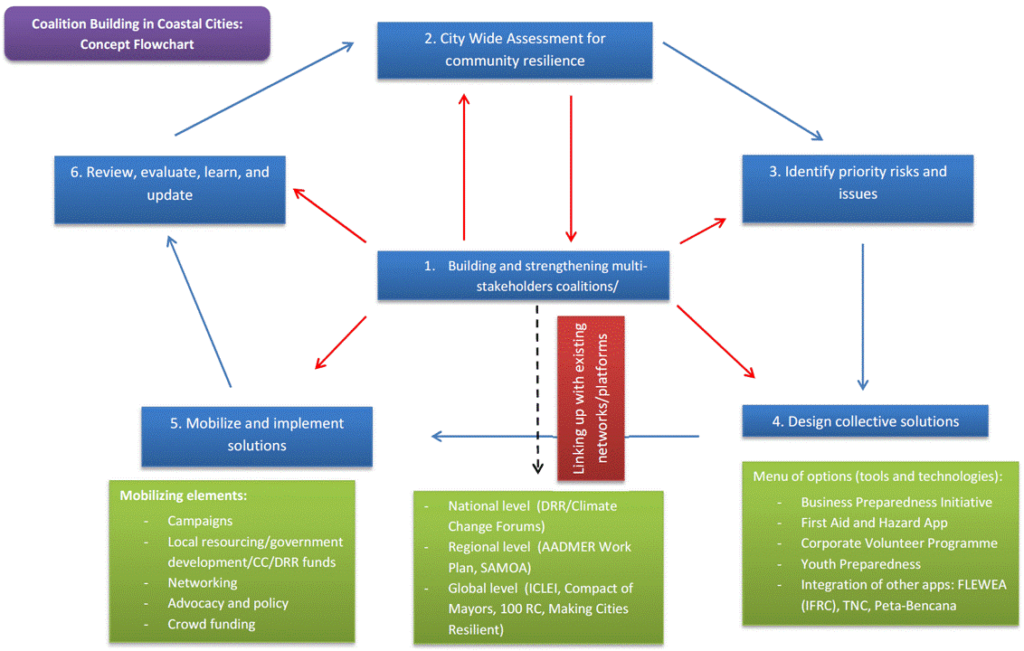Coastal Cities Project
Project description
The Nature Conservancy has joined efforts with GDPC in the Coastal Cities project to help identify ways that nature can be a part of building social-ecological community resilience before, during, and after natural disasters. As the project conducts workshops with communities and key stakeholders to discover different aspects of social-ecological resilience, through coalition building, TNC will contribute to the importance of nature conservation and geospatial technology to the dialogues.
The Coastal Resilience approach and tools will provide city-specific ecosystem data that can assist and guide city level planners and community members to make informed decisions for appropriate nature-based adaptation solutions, or natural infrastructure, as a critical component of disaster risk reduction. Find out more here
Do-It-Together toolkits and services being developed in the project

Components

Coalition-Building
Coalitions involving diverse members within the participating cities are the foundation for the rest of project activities, providing the resource -and skill- base to enable effective collective action on the priority risks identified by local stakeholders. The coalitions themselves are intended to live beyond the scope of the project and serve as a resource for ongoing civic engagement and collaboration on resilience.
The Americas region of the IFRC has already put together a set of guidance documents on coalition-building. The ‘Coalition-building in Coastal Cities’ project will build on these documents, add further case studies and examples to design and test a more detailed set of guidance materials for use in the project and more widely within 1BC.
Assessment of Community Resilience
A city-wide assessment of community resilience will anchor the start of the work of the coalition in each city. The assessment will review the relevance of the implications for community resilience in existing city risk assessments and seek to access additional secondary data, focusing especially on climate and coastal risks. The end result of the city-wide risk assessment will be a listing of priority risks facing communities in the city to serve as the targets for the wider resilience-strengthening activities that will take place under the project.
Design thinking and social entrepreneurship
To address the priority risks, the project will provide support to the local coalition to design local solutions and resourcing strategies. Where appropriate the coalitions will be encouraged to draw on existing global resources such as the corporate volunteering program developed by the Indonesian Red Cross (PMI) and the American Red Cross, the First Aid and Hazard apps, the Business Preparedness initiative being developed by the Global Disaster Preparedness Center (GDPC), the U-Report citizen reporting tool developed by UNICEF, and other similar tools and services.
Campaigns
To engage the wider communities within each city in implementing the target solutions (and to link individual and collection actions), the coalitions will integrate awareness-raising about the priority risks as well as tools and services to implement the solutions as part of a local campaign and action plan. The campaigns will be planned around timeframes appropriate to the risks and solutions being targeted and will incorporate iterative sets of activities to allow learning and adaptation over the course of the campaign implementation. The New Zealand Red Cross and the GDPC worked together on a mapping of a variety of previous awareness-raising campaigns. The ‘Coalition-building in Coastal Cities’ project will build on these documents, add further case studies and examples to design and test a more detailed set of guidance materials on campaign design for use in the project and more widely within 1BC.
Community funds
The final element in the project is catalyzing local resourcing of resilience solutions. The project includes a small community grant fund that will make awards on a competitive basis to the coalitions in the participating cities to catalyze local resilience actions. In addition, the project team will seek to link these community grant funds to other community funding opportunities. Conversations are currently underway with both the potential sources and programs for funding these initiatives. Ultimately the goal is to use these funds to match and incentivize local investment in the targeted resilience solutions through contributions to the campaign element of the project by the local business community, local government budget allocations, and public fundraising and volunteer recruitment.
Partners
The project is a joint effort with the Myanmar Red Cross, Vanuatu Red Cross, and Indonesia Red Cross Societies.


